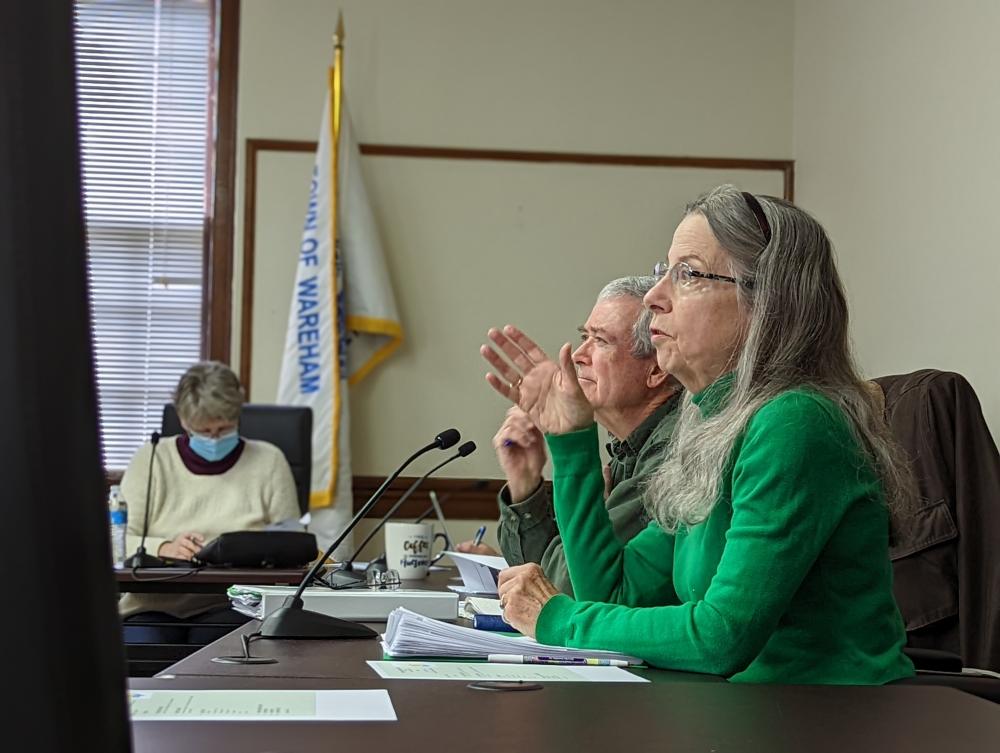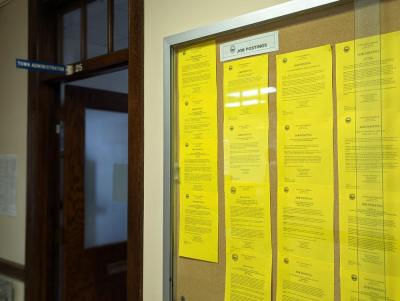Residents want better town website, bulletin boards, social media presence
Social media and the town website, bulletin boards, face-to-face chats and newspaper calendars: Wareham residents have many ideas on how they’d like to hear from their town government, and local officials listened on Thursday.
Select Board candidate Tricia Wurts volunteered months ago to complete several surveys for the town, asking people how they would like to interact with municipal government and for input on the future of Wareham Village. The researcher has spent decades working with global tech companies in her former role as president of a strategic consulting firm, Wurts & Associates, Inc.
During Wednesday’s Redevelopment Authority meeting, she presented the results of her survey: where residents say they find their information and how they feel about it. Wurts interviewed about 60 residents of various ages and occupations.
“They want to be less isolated,” Wurts said.
According to the data she collected, older residents tend to share information on Facebook, while younger citizens use Instagram and other apps to keep in touch. Wurts said surveyed residents mentioned Wareham Week and The Beacon, a publication from the Council on Aging, as oft-used resources to stay in the know about town.
An earlier survey by the Council on Aging in 2021 asked elder citizens where they go to find information. In that survey of more than 100 seniors, 96 people said they read Wareham Week, while about 30 turn to Facebook or other online sites.
But the way most residents hear about town happenings?
Simple, face-to-face chats, Wurts said.
“That was the No. 1 way of communication,” she told Redevelopment Authority members on Thursday.
Wurts explained how residents said they want the town to communicate with them about issues ranging from future meetings to periods of public comment and ongoing events. Some respondents mentioned wanting a rotating calendar of upcoming meetings in a newspaper or online.
Many called the print newspaper an important method of communication, though younger residents didn’t mention print publications as often, according to Wurts’ presentation.
About 20 residents called for the town to make more use of bulletin boards around town, sharing upcoming events and information on local issues in different physical locations across Wareham. Others called for better sound quality on WCTV broadcasts and improved town social media pages.
Many private citizens and surveyed town employees asked for a better town website, Wurts said.
Redevelopment Authority members questioned what specifically could be better about the website and shared why some fixes might be difficult.
Town Administrator Derek Sullivan said one obstacle in improving the town website is its size — the sheer amount of documents and information that’s required to be hosted and saved on the site forever. Many other towns utilize the same website format, he said, and tools like the Wareham website’s bot function are meant to help users have a smoother experience.
A more consistent way of filing documents and labeling online sections could improve the town website, Wurts said. Definitions of municipal jargon and explanations of how town committees and boards work with each other could also help, she added.
One problem highlighted by Wurts is the disconnect between the town and its citizens online, often on Facebook.
Residents want up-to-date information both on the town’s website and on its many Facebook pages, Wurts said. A lack of direct communication between the town and residents can lead to a lack of trust in town hall.
“Citizens go to Facebook influenced by the town not responding,” a surveyed citizen’s quote reads on Wurts’ presentation. “Then they talk/complain/assume/communicate what is actual with each other. This continues to build distrust for town government.”
Chair Peter Teitelbaum agreed that social media, Facebook in particular, has become a more important vehicles of communication between residents and the town.
“You’re a target if you don’t appear,” Teitelbaum said, adding though that posting to Facebook can also attract unwanted attention.
Wurts spent several hours Thursday reporting her findings and potential strategies to combat the communication gap.
Sullivan addressed several barriers that keep the town from executing some of survey respondents’ ideas, but most of them came down to one problem: a lack of town resources.
Many of the ideas are time-intensive, like updating the dozens of town social media accounts daily, posting public documents on bulletin boards strewn across town and revamping the organization of the town website.
As much as Sullivan and other authority members may want to get started on those solutions, they need buy-in from the town to have the funds to make it happen, Sullivan said.
Sullivan gave the example of having to choose between a full-time director for the Council on Aging and a hypothetical employee who could manage all of the town’s Zoom meetings. Managing these online spaces takes time and money, and without more town support, some items might not be feasible.
The Redevelopment Authority thanked Wurts for her extensive research, and members made a plan to revisit the report in two weeks to discuss next steps.















